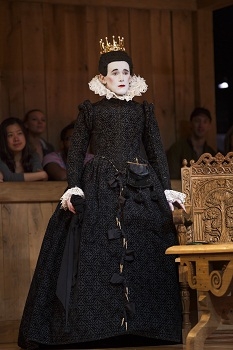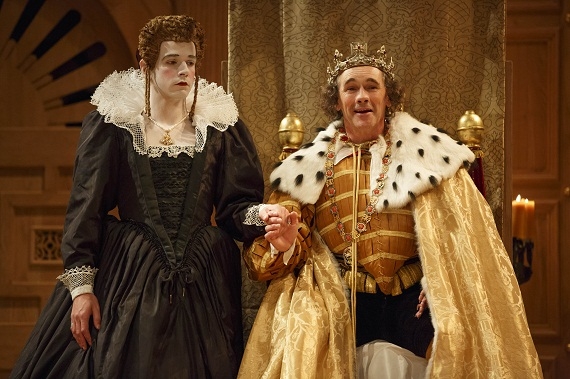The Common Sense of Shakespeare

(© Joan Marcus)
As the author of Hamlet, I feel eminently qualified to discuss that contentious subject, William Shakespeare. Let me quickly add that I am not the author of the play Hamlet, Prince of Denmark, which as far as anyone knows was written by the aforesaid Shakespeare. I am the author of the guide to Hamlet in the Barron’s Book Notes series — a work that I don’t recommend unless you happen to be a high school student who’s never read Hamlet and has a quiz on it tomorrow.
I have, of course, several better reasons for discussing Shakespeare this month. He has been asserting himself this season in a batch of productions, on Broadway and off. And very soon — appropriately on Twelfth Night (January 6) — the Acting Company will perform, in its Salon Readings series, Textual Relations, a play that (unlike Hamlet) I did write, about the afterlives of three eminent deniers of Shakespeare’s authorship. Dana Ivey will read the role of Delia Bacon, who started the whole trend of searching for alternate authors. The Acting Company has timed the occasion to fit with the New York openings, in repertory, of their current productions, Hamlet and Rosencrantz and Guildenstern Are Dead. (Shakespeare apparently contributed only a few lines to the latter work, which scholars allege is mostly by one Tom Stoppard.)
But my best reason for discussing Shakespeare now is that, apparently unlike many people who’ve lately weighed in on the subject, I am calm about him. I believe, with reason, that he wrote the plays and poems usually ascribed to him, but if somebody came up with genuinely convincing evidence that he didn’t, I doubt that either I or the world’s university libraries would collapse from the shock. Many people over the last two centuries, including some great minds (Mark Twain, Henry James, Sigmund Freud) have wanted to believe that somebody else was the real author. An even larger number believes that “Shakespeare” is the name of a special category of play that requires a special approach all its own. In some ways this latter misapprehension is even more damaging to Shakespeare than the simple suspicion that Sir Francis Bacon or the Earl of Oxford or whoever smuggled the texts into performance, using a humble, semiliterate actor as a “front” like the blacklisted screenwriters of the 1950s. (Personally, I’d believe that Dalton Trumbo or Ring Lardner Jr. wrote the plays sooner than Bacon or Oxford, but the chronology won’t wash.)
It’s intriguing to compare the confused notions about Shakespeare to those that afflict Mozart. Both men did their work so supremely well that they provoke mythologies about the source of their authorship. Mozart, living in a more orderly later time, left behind few unanswered questions about what he had written. Instead, his achievement spawned psychobabble depicting him as a sort of moonstruck idiot savant, inexplicably equipped with a heaven-sent musical tap that he could turn on at will. That the tap’s flow was abruptly cut off by his death at an unseasonably young age seemed so grievously unjust that nonsensical conspiracy theories inevitably followed.
With Shakespeare, it was the same only different. Because his playwriting career seemed to follow a natural trajectory, no one found his death sufficiently early or abrupt to require a conspiracy theories. But while Mozart wrote most of his adult works as an independent contractor, and kept a generally tidy catalog of them, Shakespeare, as actor and shareholder in a theater company, was a cog in a corporate wheel. His plays did not belong to him but to the company, though he presumably had some say in their interpretation and disposition. The campaigners for an alternative author make much of no manuscripts having been listed among his effects when he died (though a chestful of his papers was apparently destroyed in a fire at his son-in-law’s house), but the majority of copies of his texts would have been kept in the company’s library — along with the copies of all those books, source material for the plays, that Shakespeare himself was supposedly too poor to have purchased.
Because Mozart’s genius was apparent to his contemporaries, the myth that he had been poisoned started circulating fairly soon after his death. (Vienna, like other big cities, has always been full of ditz-brains who confuse celebrity gossip with aesthetic discussion.) The myth that Shakespeare didn’t write his plays took a far longer time to arise. It only began — around the time Mozart died, ironically — after his works had reestablished themselves as theatrical staples, and their success had led 18th-century poetasters to idolize him. Professor James Shapiro’s delightful and informative book, Contested Will: Who Wrote Shakespeare?, which narrates how the misguided notion evolved, rightly begins with David Garrick, a great actor and loyal Shakespearean who would have been horrified to discover that his Shakespeare Jubilees and odes had led, not only to the poet’s elevation, but to the creeping suspicion that a genius of such high rank couldn’t possibly have been a mere alderman’s son from a puny hick town like Stratford.
Creeping suspicions, like kudzu, are persistent. To eradicate them requires a lot of chopping. The choppers’ advantage lies in the many facets of Shakespeare’s situation that his deniers, like his idolaters, overlook. Their first mistake is to view the text of a play as an absolute, handed down from above. This suits their notion that the author must have been an aristocrat, well-schooled in statecraft, who was using the theater for his own higher purposes. Unluckily for them, it doesn’t suit either the texts we have or the common-sense evidence of theater practice.
Edward Albee, famously, doesn’t allow one comma of his scripts to be altered. But anyone else who’s ever had a play produced can tell you that, if an aristocrat wants to spread enlightenment through a written-in-stone definitive text, the last place he should go is the theater. There, speeches are lengthened to cover set changes, cut because actors can’t say them or the producer can’t comprehend them, rephrased to fit the performer’s physical attributes, shortened to avoid accidental reference to some current event, or revised for seven thousand other reasons. After all of which, there is still nothing whatever to prevent an actor, in the heat of the moment, from saying, “Holy sh*t! What was that?” instead of “Hark! I hear the cannon roar.”
The above is merely to say that, while an aristocrat might write one or even two plays to serve some ulterior purpose, only a lunatic, or a person professionally involved in the theater, would repeat the process as frequently as “Shakespeare” did. Bacon and Oxford had better things to do with their time. But I’ll have more to say about Shakespeare’s deniers, and the productions some of his idolaters have lately perpetrated, next week.

(© Joan Marcus)
Stay tuned to TheaterMania for part II of this "Thinking About Theater" column, which will appear on Friday, December 20.














